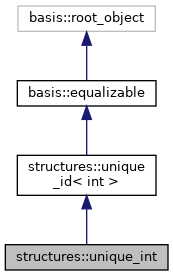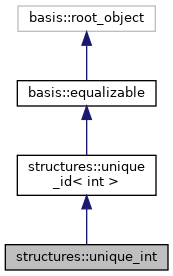structures::unique_int Class Reference
A unique identifier based on integers. More...
#include <unique_id.h>
Inheritance diagram for structures::unique_int:

Collaboration diagram for structures::unique_int:

Public Member Functions | |
| unique_int (int initial=0) | |
| implicit default for "initial" of zero indicates bogus id. More... | |
| bool | operator! () const |
| provides a way to test whether an id is valid. More... | |
 Public Member Functions inherited from structures::unique_id< int > Public Member Functions inherited from structures::unique_id< int > | |
| unique_id (int initial_value) | |
| Constructs a unique id from the "initial_value". More... | |
| unique_id (const unique_id< int > &to_copy) | |
| Constructs a unique id as a copy of the "to_copy" object. More... | |
| ~unique_id () | |
| virtual bool | equal_to (const equalizable &to_compare) const |
| bool | operator== (const unique_id< int > &to_compare) const |
| Returns true if the held id is the same as "to_compare". More... | |
| unique_id & | operator= (const unique_id< int > &to_copy) |
| Sets this id to be the same as "to_copy". More... | |
| int | raw_id () const |
| Returns the held identifier in its native form. More... | |
| void | set_raw_id (int new_value) |
| Sets the held identifier to "new_value". More... | |
 Public Member Functions inherited from basis::equalizable Public Member Functions inherited from basis::equalizable | |
| virtual bool | equal_to (const equalizable &s2) const =0 |
| virtual bool | operator== (const equalizable &s2) const |
| the virtual method for object equality. More... | |
Detailed Description
A unique identifier based on integers.
Definition at line 96 of file unique_id.h.
Constructor & Destructor Documentation
◆ unique_int()
|
inline |
implicit default for "initial" of zero indicates bogus id.
Definition at line 99 of file unique_id.h.
Member Function Documentation
◆ operator!()
|
inline |
provides a way to test whether an id is valid.
This uses the implicit assumption that a zero id is invalid or unassigned.
Definition at line 102 of file unique_id.h.
References structures::unique_id< int >::raw_id().
The documentation for this class was generated from the following file:
- /opt/feistymeow.org/feisty_meow/nucleus/library/structures/unique_id.h